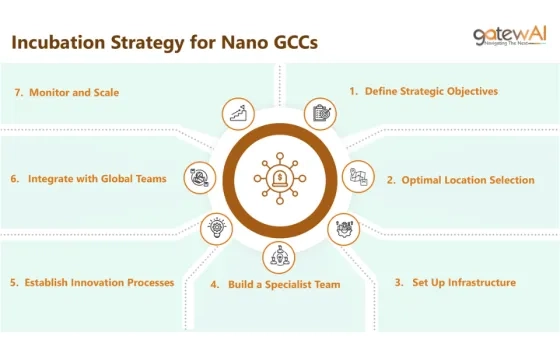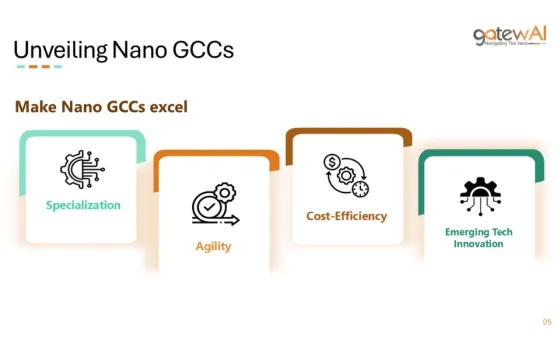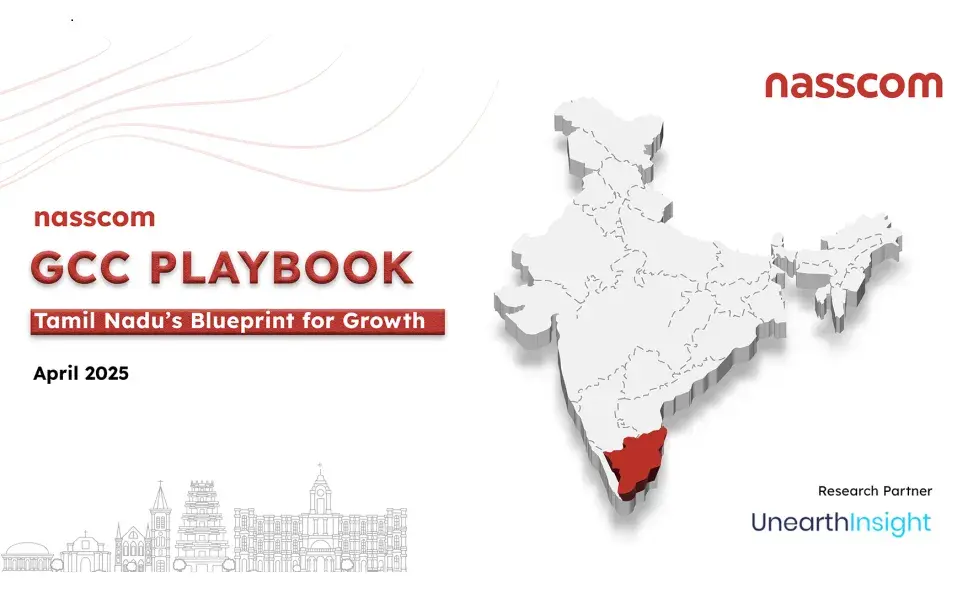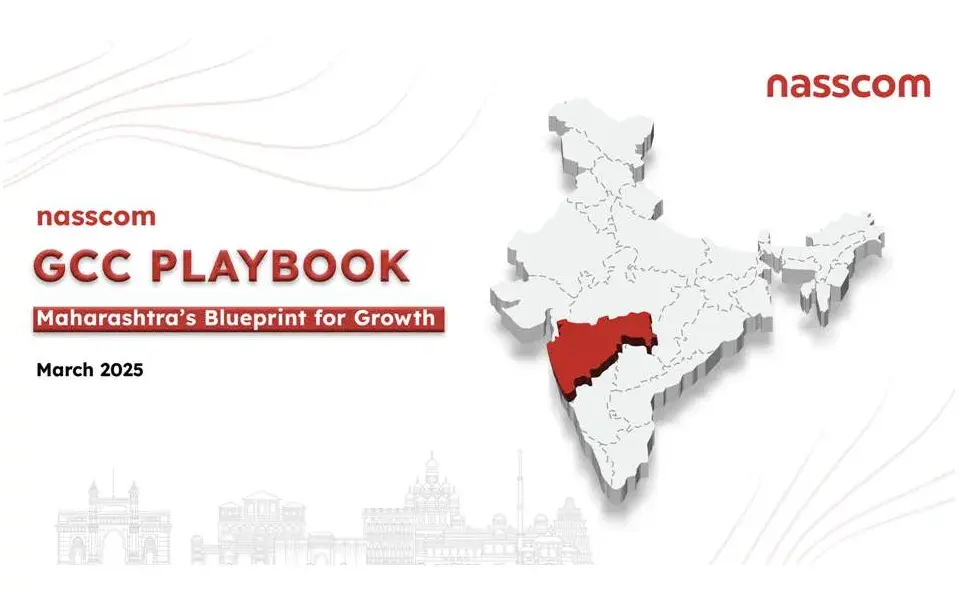Introduction
The rapid digitization of business processes and the globalization of corporate operations have made Global Capability Centers (GCCs) indispensable for multinational corporations (MNCs) seeking to enhance operational efficiency, foster innovation, and create scalable digital solutions. GCCs, initially established as support hubs, have evolved into centers of transformation, enabling companies to build core capabilities in emerging fields like artificial intelligence (AI), cloud computing, and digital product development. Over the last decade, India has emerged as a dominant force in the GCC landscape, home to over 1,700 GCCs that contribute $64.6 billion to the national economy and employ a workforce of nearly 2 million professionals. This business case demonstrates why India has become the preferred location for global corporations establishing or expanding their GCC footprint.
The Unparalleled Growth of India’s GCC Ecosystem
India's GCC sector has expanded remarkably over recent years, driven by a combination of government support, an abundant talent pool, cost advantages, and robust infrastructure. From being mere operational centers, more than half of Indian GCCs have transformed into high-value, complex portfolio hubs where companies can execute strategic initiatives across multiple domains, such as technology, operations, and customer service. Engineering and Research & Development (ER&D) GCCs, in particular, have seen a 1.3x growth rate, reflecting the rapid maturation of India’s capabilities in high-end functions like AI, product engineering, and software development. By hosting such advanced functions, Indian GCCs contribute directly to global corporate growth, allowing MNCs to innovate, scale, and stay competitive.
Cost Efficiency as a Cornerstone
A significant advantage of establishing GCCs in India lies in the cost structure. India offers a competitive cost model where the average annual operational cost per GCC employee stands at approximately $25,000. When compared to other regions, this is up to 40% lower than Eastern Europe and 30% lower than Latin America. This cost differential provides MNCs with substantial savings while maintaining high standards of operational efficiency. Cost-effective labour, supported by favourable exchange rates and controlled inflation, contributes to this financial advantage, making India not only affordable but also sustainable over the long term. For MNCs, this translates to a high-quality GCC environment that balances cost with performance, crucial for projects requiring significant human resources, like software development, data processing, and ER&D.
India’s Deep Talent Pool
One of India’s most significant assets is its highly skilled talent base, making it the preferred destination for talent-driven functions. With over 1.9 million professionals already working in GCCs and an influx of 1.5 million STEM graduates each year, India offers an unmatched depth of expertise across various domains. India’s workforce is particularly strong in high-demand sectors such as AI, machine learning (ML), digital transformation, and ER&D. Notably, India has established 185 AI/ML Centers of Excellence (CoEs) and employs over 120,000 AI specialists, supporting its growing reputation as a leader in digital innovation and advanced analytics. This talent infrastructure provides MNCs with continuous access to experts in frontier technologies, enhancing their ability to execute complex projects that require specialized skills.
Innovation and Digital Maturity: The Hallmarks of Indian GCCs
As India’s GCC ecosystem matures, these centers have transformed into innovation hubs, with 90% of GCCs now managing multi-disciplinary functions that include technology, operations, and product engineering. Such functional diversity allows Indian GCCs to undertake high-value tasks, thereby advancing digital transformation agendas for their parent companies. India’s favorable regulatory environment further bolsters this innovative edge. The “Digital India” initiative and other supportive policies, such as tax incentives and grants for R&D, encourage corporations to invest in long-term projects that drive digital growth. Many Indian GCCs have also developed strategic partnerships with local startups and academic institutions, creating a dynamic environment that accelerates technological advancement and digital maturity.
Comparative Advantage: India vs. Global Competitors
India stands out in the global GCC landscape due to its unique combination of cost efficiency, talent availability, and innovative capabilities. When compared with other popular GCC destinations like Eastern Europe, Latin America, and the Philippines, India offers:
- Cost Savings: Operational costs in India are 40% lower than in Eastern Europe and substantially less than in many other emerging markets. This cost-effectiveness allows companies to reinvest savings into other business areas or scale up their operations in India without escalating expenses.
- Talent Depth: India’s talent pipeline is vast and highly skilled, providing MNCs with a steady influx of professionals adept in cutting-edge technologies, particularly in AI, ER&D, and digital transformation. The continuous graduation of skilled STEM students ensures a sustainable supply of qualified professionals ready to meet future demand.
- Innovation Capacity: With a significant number of GCCs functioning as multidisciplinary centers, India has fostered a culture of high-value growth and continuous innovation. This setup empowers GCCs to explore new business models, digital solutions, and product innovations that contribute to their parent company’s global competitive edge.
Challenges and Mitigation Strategies
While India offers significant advantages, establishing and managing a GCC in India may present challenges, such as infrastructure limitations, regulatory complexities, and the need for robust data privacy measures. However, the Indian government has made strides in improving infrastructure, especially in Tier 2 and Tier 3 cities, which are now emerging as alternative hubs for GCCs. These cities offer additional cost benefits, reduced congestion, and access to a growing talent pool. Regulatory reforms and adherence to global standards, particularly in data security and intellectual property protection, further enhance India’s attractiveness. Many MNCs mitigate potential risks by adopting a hybrid strategy, establishing GCCs across multiple cities to diversify risks and optimize resource availability.
Future Outlook: The Road to 2030 and Beyond
The future of India’s GCC ecosystem looks promising, with projections indicating that by 2030, the GCC sector could reach $100 billion in value and employ over 2.5 million professionals. This growth is expected to be driven by ongoing digital transformation, increasing investment in automation and AI, and India’s expanding role in strategic business functions. As India’s economy continues to grow, the government’s commitment to creating a business-friendly environment is likely to draw even more foreign direct investment (FDI) into the GCC sector. Future developments may also see Indian GCCs becoming central to global sustainability initiatives, with a focus on green technologies and renewable energy solutions, which align with global corporate priorities in environmental responsibility.
Conclusion: India as the Ideal GCC Destination
India's GCC ecosystem presents a compelling business case for multinational corporations aiming to improve operational efficiency, drive innovation, and support long-term growth. With its strategic advantages in cost, talent, and innovation, India has established itself as an unmatched destination for GCCs, particularly for companies focused on scaling digital initiatives and enhancing global competitiveness. As corporations continue to prioritize both cost efficiency and advanced digital capabilities, India’s GCC landscape will likely remain a cornerstone of global corporate strategies in the years to come. For companies ready to lead in the digital era, India offers an optimal foundation—a reliable partner for sustainable and transformative growth.
Industry Insights and Further Analysis
The case for establishing GCCs in India is reinforced by insights from industry leaders and data from recent reports. For example, a recent study by Deloitte indicates that 58% of Fortune 500 companies with GCCs in India report achieving higher-than-expected returns on their digital investments, largely attributed to the cost efficiencies and innovation capabilities unique to the Indian ecosystem. Additionally, data from NASSCOM highlights that GCCs in India invest significantly in workforce development, with training programs focusing on next-generation skills like AI, cloud computing, and cybersecurity, which aligns with the strategic needs of MNCs in a rapidly evolving digital landscape.
For further insights on building or expanding a GCC in India, companies should consider exploring city-specific advantages, regulatory developments, and emerging technological capabilities through a detailed market study or consultation with local experts. Such information can be invaluable for tailoring the GCC setup to meet specific corporate goals.

















